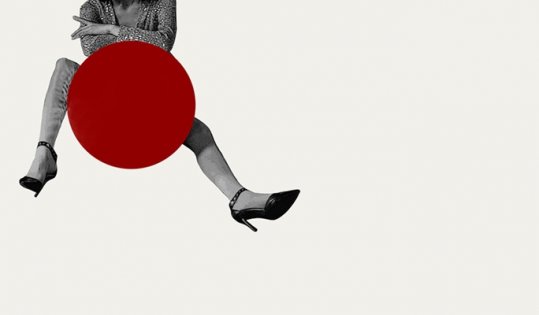We all come from a vagina - interview with Dominika Kulczyk

We are going to talk about things that are quite difficult to talk about.
I am very pleased that we are talking about menstruation, about periods, private parts, nether regions. These terms have been invented over the years. We already know today that how we talk about a very important, natural and undeniable phenomenon of nature, that is to say, female menstruation, is an indication of how we feel about it. There are still too many people who believe that this is only a matter for women. It is not serious and not important enough.
Is it not?
I am reminded of a wonderful quotation from a film about Michalina Wisłocka, when she tries to convince one of the decision-makers to publish a book about sexuality for the benefit of Poles. And she feels resistance. She sees that the conversation is going nowhere, because there is no understanding of the subject which she wants to address from the opposing side. She says to him, then, already considerably irate: "Where are you from?" He says: "From Warsaw". "Not from Warsaw,' replies Wisłocka. "You are from a vagina.” When we realise this simple fact, we begin to understand that this is a matter for all of us. Menstruation is not only a matter for girls, mothers, wives or lovers. After all, they are the whole world to men. They share life with them. They also share 'those days', which are fraught with prejudice. The problems associated with this also concern men. Until recently, this self-evident reality has been denied.
Let women have periods, but why talk about it? Even in advertisements for sanitary towels, the blood used to be blue.
The world is beginning to talk about menstruation because we are developing as a human race. After all, understanding our sexuality and carnality is fundamental. If it turns out that the body does not possess the soul, but rather the soul takes on the body, then through this body the here and now is realised. Regardless of our origin, the wealth in our wallets or our religion, we are flesh and we will not break away from our carnality. Half the world has a woman's body and therefore experiences everything that is ascribed to the woman, including menstruation.
But talking about menstruation is still not easy for us for some reason.
Talking openly about women's biology only started at the beginning of the 21st century. Previously, it was associated with shame, and strange, unknown powers were attributed to this phenomenon. For example, during menstruation, people would say that one must not milk cows, pickle cabbage or go to the dentist. It is striking that some of these superstitions still apply, and for many women periods are still an embarrassment. A report from a study commissioned by my Foundation showed that even today, in Poland, 41% of adult women declare that they have never talked about their periods at home. Silence about menstruation is a little bit like pushing out the female viewpoint in the world.
I also found some optimistic information in the aforementioned menstrual studies, which were commissioned by the Kulczyk Foundation. For example, that teenagers use menstrual myths much less frequently than older women…
That is encouraging, because it means that we are breaking down the surrounding shame more and more effectively. I am proud of women because I understand this shame perfectly well and I have experienced it myself. Just a year or two ago, I could not tell my friends or colleagues: ‘I have a period today, so I have to go buy a tampon'. Or that I want to shorten the meeting because I feel worse than usual. Or that I do not necessarily feel like going out for a drink. We are all the same miracle-woman. I am very happy that we are becoming more and more open with our femininity.
That's a big change, because mothers who are now starting to talk bravely about menstruation with their daughters were still whispering discreetly about these issues with their own mothers.
The fact that girls and younger women are more easily able to talk about their sexuality and their bodies is proof that we no longer want the restrictions of 'you mustn't talk about it', 'it's such a feminine thing', and we are beginning to listen to nature. And it is natural to share what concerns me. It is healthy, it is good, and it is the way it should be. We do not let ourselves be told that we are not as good and important as the opposite sex. A woman is a specialist in dealing with difficulty and in bringing about change.
If there is someone who has to change stereotypes about menstruation, it must be women?
Sure. And we will deal with it as with any change. That is what happens. Because our topics, and indeed those of the whole world, are beginning to exist in the public space. Today we wake up. Feminist movements are acting more and more vigorously, speaking more and more loudly and more strongly about women's rights and what concerns women. They also talk about menstruation. It is as if we do not want to and can no longer pretend that we are not indestructible, that we need each other, that we expect understanding and sometimes we need support. Something which seems like a weakness is not really a weakness, because when we know how to admit it, it shows our strength. It is fascinating to be a woman at a time when the world is beginning to realise the power and beauty of its female side.
That is why the Kulczyk Foundation is a pioneer of research which has not yet been carried out in Poland?
Yes, and I am proud to be part of this awakening on the important subject of 'woman'. I want to talk about this because it all starts with talking. We, mothers, saying to our daughters, 'You have a period, that is great. You will be able to cope with it, and besides, the world is supposed to support you in this, because you, by having a period, will give mankind a chance to survive one generation longer’. We are fighting for balance in the world. We must start by saying that there is nothing to be ashamed of. We need to talk about what is essential. It is not easy, because people still find it difficult to talk about it and they lack hard facts in discussions. No one has studied this before. We pretended that there is no topic. It is unbelievable.
What else does your research show?
For example, that one third of teenagers are not ready for their period when it comes, and 25% of adult women think it is impossible to get pregnant during menstruation. In Poland, women also experience menstrual poverty - they sometimes do not have the money to buy tampons or sanitary towels. Menstrual poverty has an impact on women's health, because it can lead to infection and forces women to live in suffering. It has psychosocial effects, because it brings with it stigma and a sense of shame. It also results in limited access to school, even dropping out of school. This, in turn, leads to negative economic effects, because it restricts women's access to the labour market.
All this is shocking. It shows how much we have to do. If we do something, we do it with full commitment and to the best of our ability. That is why the Kulczyk Foundation has commissioned similar research worldwide. I joined Founders Pledge, an international non-profit group focusing on philanthropic activities, and these studies on menstrual health and hygiene are the beginning of our cooperation.
Is menstrual poverty really a global problem?
Research results leave no doubt that millions of women have limited access to menstrual hygiene products and menstrual education for economic reasons. Studies also show that, of the 1.9 billion menstruating women in the world, around half a million cannot fully take care of their hygiene during menstruation. After all, access to menstrual hygiene products is a fundamental right. Without it, women and girls cannot live with dignity. It is outrageous that girls around the world have no chance of a better education because they are too poor to deal with menstruation.
Research has also shown, and this frightened me, that menstruation is still a cause for mockery and persecution.
It is therefore not just a game to make sanitary towels available for every girl to buy them. We are working for girls to feel like fully-fledged people, on a par with boys. So that she is not ashamed of going to school, of bleeding because she has no access to hygiene products, feeling dirty and the subject of ridicule. I heard from one of the organisations I work with a few weeks ago about a girl from Kenya who committed suicide because of this. And these are not stories plucked out of thin air. It is, unfortunately, happening in real life. It turns out that 200 million women in India do not know how to take care of hygiene during their menstruation, and 23% give up on school during their period to avoid stigmatisation. Studies also show that even if girls get money from their mothers for sanitary towels, they are ashamed to ask for them in the local shop where the shop assistant is a man.
Are we ashamed in Poland too?
Sure. This shame is universal, unfortunately. Until recently, I, too, was ashamed to say to a man in a pharmacy ‘sanitary towels, please', although I am from Central and Eastern Europe, I am well-educated, I have no complexes or problems with social contact.
Can the coronavirus epidemic have an impact on this situation?
I am convinced it already has because it has led to the impoverishment of many families. The worsening economic situation of people always mainly affects women, which will also translate into this aspect of life. That is why I do not agree that the epidemic and related matters should deflect attention from so many other important matters in the world.
Are you planning any further action?
The problem needs to be diagnosed in order to find the wisest, most effective and fairest method of solving it. We have made that diagnosis. The report by the Kulczyk Foundation and Founders Pledge indicates that around 450 billion dollars is spent annually on charities in the United States, and between 10 and 100 million dollars is spent on matters relating to the support of women. We live in a world where one in five women has to choose whether to buy sanitary towels or bread for themselves and their children. In a world where women cannot go to work or school because of their period or - as in Nepal - are sent to a menstrual hut because they are considered unclean. In such huts, women can be kidnapped, killed, bitten by a snake. I do not believe in such a world. There is one thing I am absolutely certain of - you have to act quickly. I state loudly that governments should immediately abolish the tax sanitary towels, because it is unjust for a woman to be charged an additional fee for her biological disposition. At Founders Pledge, we are working with organisations that are working to combat menstrual poverty in the world. I have a plan on how to get NGOs involved. But it is too early to give away details.
Agnieszka Urazińska interviews Dominika Kulczyk
The interview was published in "Wolna Sobota” of "Gazeta Wyborcza” on 17 October 2020


